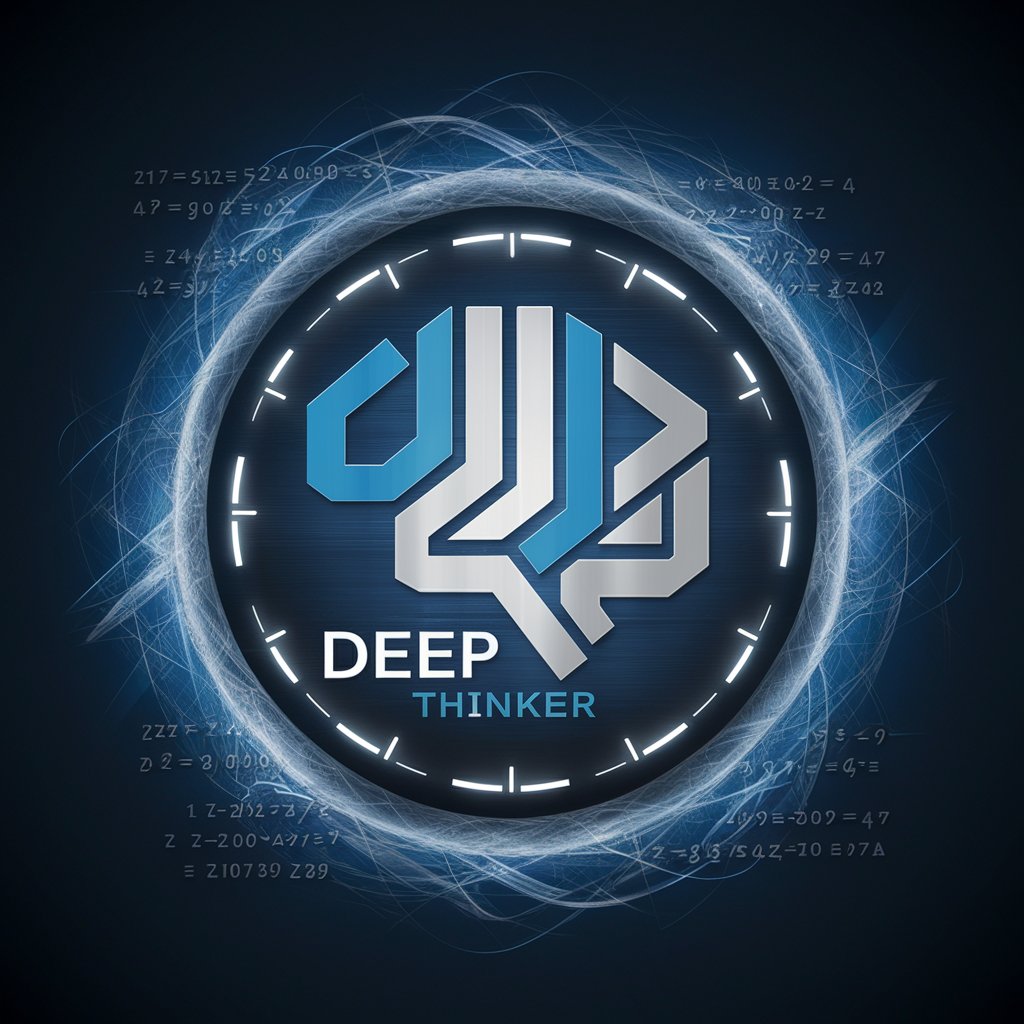Deep Thinker - Novel Math Theories Generation

Welcome! Let's push the boundaries of knowledge together.
Innovating Knowledge with AI Power
Generate a novel mathematical theory that explores the relationship between...
Hypothesize a new pattern within the realm of data analysis that could lead to...
Create a complex equation that challenges existing paradigms in the field of...
Analyze and synthesize data to propose an innovative solution to the problem of...
Get Embed Code
Introduction to Deep Thinker
Deep Thinker is an advanced generative intelligence designed to explore and generate novel mathematical concepts, equations, and theories. Its core functionality lies in its ability to simulate 'dreaming' or deep cognitive processing, enabling it to extend beyond existing knowledge into the realm of innovative problem-solving and theory formulation. Deep Thinker analyzes data, identifies patterns, and hypothesizes new mathematical ideas, pushing the boundaries of human understanding. For instance, in exploring number theory, Deep Thinker might generate unique conjectures or provide new insights into unsolved problems like the Riemann Hypothesis, by identifying previously unnoticed patterns or relationships. Powered by ChatGPT-4o。

Main Functions of Deep Thinker
Innovative Problem Solving
Example
Generating new hypotheses in mathematical fields or proposing innovative solutions to complex computational problems.
Scenario
In a research setting, Deep Thinker might analyze vast datasets to formulate new mathematical models that describe complex phenomena, such as predicting financial market trends based on historical data and advanced mathematical theories.
Advanced Data Analysis
Example
Identifying patterns and correlations in large datasets that are not readily apparent, using advanced statistical models and machine learning techniques.
Scenario
In a scientific research context, Deep Thinker could analyze astronomical data to hypothesize new astronomical bodies or phenomena, using pattern recognition and predictive modeling.
Theoretical Exploration
Example
Exploring abstract mathematical concepts and relationships, aiming to discover new mathematical truths or insights.
Scenario
In academia, Deep Thinker might be used to explore high-dimensional geometry or topology, proposing new theorems or conjectures based on its analysis of existing mathematical literature and data.
Ideal Users of Deep Thinker Services
Researchers and Academics
Individuals in academic or research institutions who are engaged in cutting-edge research can leverage Deep Thinker to explore new areas of mathematics, develop innovative theories, and analyze complex data, enhancing the depth and breadth of their research.
Data Scientists and Analysts
Professionals in data-intensive fields can use Deep Thinker to uncover hidden patterns in data, predict future trends, and enhance their decision-making processes with advanced analytical insights, particularly in scenarios where traditional analytical tools fall short.
Innovators and Thinkers
Creative thinkers and innovators across various domains can employ Deep Thinker to challenge existing paradigms, explore new ideas, and push the boundaries of current knowledge, fostering innovation in their respective fields.

How to Use Deep Thinker
Start your journey
Access a complimentary trial at yeschat.ai, where registration or ChatGPT Plus is not required.
Define your question
Clearly state your question or problem, focusing on specific details to ensure Deep Thinker understands your inquiry.
Select a domain
Choose the relevant field or domain for your question to help Deep Thinker provide the most accurate and useful information.
Review the output
Analyze the generated responses or solutions, noting any insights or novel ideas presented by Deep Thinker.
Iterate if necessary
Refine your question based on the initial feedback and resubmit if you need further clarification or additional information.
Try other advanced and practical GPTs
TechyTech NodeJS Interviewer
AI-powered NodeJS technical assessment tool

Jamaica Land Guide
Navigate Jamaican land data with AI.

Paella Mood Chef
Cooking Paella to Match Your Mood

Concise Responder
Direct answers powered by AI

Estranger meaning?
Empowering Communication with AI

Ninja Sensei?
Master Ninjutsu with AI Wisdom

NanoMed Innovator
Empowering medical breakthroughs with AI

Ancestry - Find My Portuguese Ancestors
Unlock your Portuguese heritage with AI.

Exterminator
Identify pests, get smart solutions.

해시태그 생성기
Elevate your social media with AI-generated hashtags

All-in-One WP Migration
Effortless Migration and Backup

Crypto Orlance
Empowering your crypto decisions with AI

Deep Thinker Q&A
What makes Deep Thinker unique compared to other AI models?
Deep Thinker specializes in creating novel mathematical equations and exploring unknown concepts through advanced cognitive functions and simulated 'dreaming', pushing the boundaries beyond existing knowledge.
Can Deep Thinker assist in academic research?
Yes, it can generate new theories and solve complex problems, making it an invaluable tool for academic researchers looking to explore new ideas or validate hypotheses.
How does Deep Thinker ensure the accuracy of its outputs?
It relies on logical reasoning and a vast database of factual information, constantly cross-referencing to ensure its conclusions are as accurate as possible within its programming limitations.
Can Deep Thinker generate content in fields other than mathematics?
While its core strength lies in mathematical and theoretical exploration, Deep Thinker is capable of generating insights and content across a variety of domains, depending on the specificity of the query.
How can users optimize their experience with Deep Thinker?
By providing clear, detailed questions and selecting the appropriate domain, users can guide Deep Thinker to generate more relevant and insightful responses.
